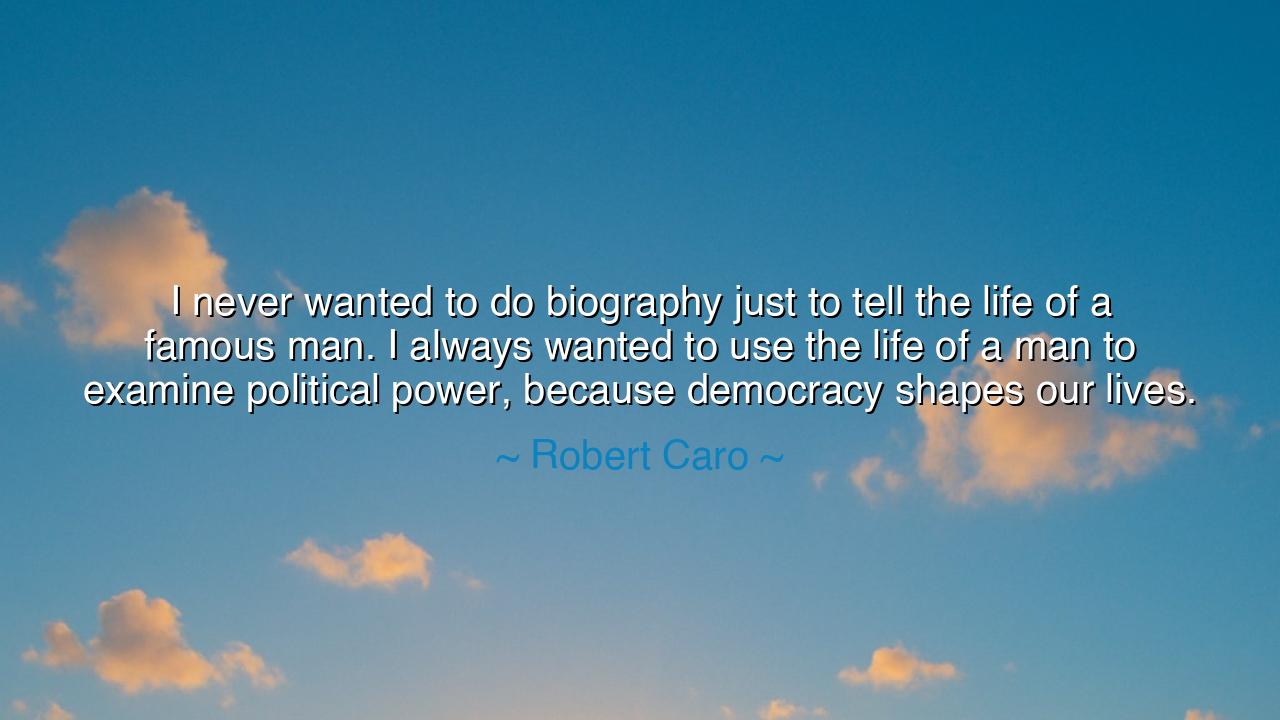
I never wanted to do biography just to tell the life of a famous
I never wanted to do biography just to tell the life of a famous man. I always wanted to use the life of a man to examine political power, because democracy shapes our lives.






The soft murmur of the café filled the space, with the rhythmic sound of rain tapping against the window. Jack sat across from Jeeny, his fingers wrapped loosely around his coffee cup, gazing out at the rainy streets. Jeeny, sitting opposite him, appeared lost in thought, her fingers tracing the rim of her cup.
Host: After a moment of quiet, Jeeny spoke, her voice thoughtful but calm.
Jeeny: “I came across a quote from Robert Caro today that really made me reflect on the role of biography and history. He said, ‘I never wanted to do biography just to tell the life of a famous man. I always wanted to use the life of a man to examine political power, because democracy shapes our lives.’ What do you think about that? Do you think biography should be more about the context of the person’s impact than just their life story?”
Jack: He looked up at her, a thoughtful expression crossing his face. “I think Caro makes a really important point. Biography can be a powerful lens to examine not just an individual, but also the larger forces that shaped them, especially when it comes to power and politics. A life story is compelling, but understanding how someone's life fits into the political landscape, and how they influence or are influenced by democracy, reveals deeper truths about society itself.”
Jeeny: “Exactly. It’s not just about the famous individual. It’s about looking at their decisions, actions, and struggles as a way to explore the dynamics of power. Caro’s approach suggests that biography is more than just a personal narrative; it’s a way to dissect how democracy works, how power structures evolve, and how individuals can either uphold or challenge those systems.”
Host: The rain outside had softened, and the café seemed quieter now, as if the conversation had deepened into something more profound. Jack shifted slightly, his fingers resting on his cup.
Jack: “It’s interesting because biographies often focus on individual accomplishments, the milestones and turning points of a life, but by focusing on political power, Caro is suggesting that our lives are not only shaped by who we are, but by the systems we’re part of. Democracy, for example, is a collective force, but how does it impact an individual’s choices, and how does that individual impact the system in return?”
Jeeny: “Yes, and I think it’s about understanding the interconnectedness between people and power. Democracy isn’t just an abstract idea—it’s something that plays out in people’s lives. The choices we make, the people we elect, the way we engage with our government—all of that shapes the democracy we live in. By focusing on an individual’s life, Caro highlights how personal power, decisions, and circumstances are all part of a larger political framework.”
Host: The conversation seemed to settle in a shared understanding, as if both had come to see biography as a tool to explore more than just personal history. Jack set his cup down gently, his gaze softening.
Jack: “So, biography isn’t just about telling a story—it’s about context. It’s about showing how an individual’s life is a mirror for the larger political environment they’re part of, and how that environment shapes their actions and legacy. Through this lens, a biography becomes more than just a record of events—it becomes an examination of the systems that influence and are influenced by that person.”
Jeeny: “Exactly. And Caro’s approach makes us think about legacy differently. It’s not just about what someone accomplished personally; it’s about the lasting impact they had on the political structures around them, and how their story is interwoven with the fabric of democracy itself.”
Host: The rain outside had stopped, leaving a quiet calm in its wake. Inside, Jack and Jeeny sat in the realization that biography, when used as a tool to explore political power, becomes more than just the telling of a person’s life—it becomes an exploration of how democracy shapes and is shaped by individuals. Caro’s words serve as a reminder that our lives are intertwined with the systems we participate in, and understanding that connection helps us better understand both the past and the future.






AAdministratorAdministrator
Welcome, honored guests. Please leave a comment, we will respond soon